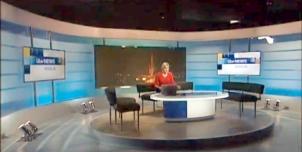Full Freeview on the Tacolneston (Norfolk, England) transmitter
| Google Streetview | Google map | Bing map | Google Earth | 52.518,1.139 or 52°31'6"N 1°8'22"E | NR16 1DW |
The symbol shows the location of the Tacolneston (Norfolk, England) transmitter which serves 330,000 homes. The bright green areas shown where the signal from this transmitter is strong, dark green areas are poorer signals. Those parts shown in yellow may have interference on the same frequency from other masts.
_______
Digital television services are broadcast on a multiplexes (or Mux) where many stations occupy a single broadcast frequency, as shown below.
64QAM 8K 3/4 27.1Mb/s DVB-T MPEG2
DTG-12 QSPK 8K 3/4 8.0Mb/s DVB-T MPEG2
H/V: aerial position (horizontal or vertical)
Which Freeview channels does the Tacolneston transmitter broadcast?
If you have any kind of Freeview fault, follow this Freeview reset procedure first.Digital television services are broadcast on a multiplexes (or Mux) where many stations occupy a single broadcast frequency, as shown below.
64QAM 8K 3/4 27.1Mb/s DVB-T MPEG2
DTG-12 QSPK 8K 3/4 8.0Mb/s DVB-T MPEG2
H/V: aerial position (horizontal or vertical)
Which BBC and ITV regional news can I watch from the Tacolneston transmitter?

BBC Look East (East) 0.8m homes 3.2%
from Norwich NR2 1BH, 16km northeast (37°)
to BBC East region - 27 masts.
70% of BBC East (East) and BBC East (West) is shared output

ITV Anglia News 0.8m homes 3.2%
from NORWICH NR1 3JG, 16km northeast (38°)
to ITV Anglia (East) region - 26 masts.
All of lunch, weekend and 80% evening news is shared with Anglia (West)
Are there any self-help relays?
| Gt Yarmouth | Transposer | 1 km S town centre | 30 homes |
| Lowestoft (2) | Transposer | Rotterdam Rd | 125 homes |
How will the Tacolneston (Norfolk, England) transmission frequencies change over time?
| 1950s-80s | 1984-97 | 1997-98 | 1998-2011 | 2011-13 | 2013-18 | 2013-17 | 17 Jul 2018 | ||
| VHF | C/D E | C/D E | C/D E | E | E T | W T | W T | ||
| C3 | BBCtvwaves | ||||||||
| C31 | com7 | com7 | |||||||
| C32 | _local | ||||||||
| C37 | com8 | com8 | |||||||
| C39 | +ArqB | +ArqB | ArqB | ||||||
| C40 | BBCA | ||||||||
| C42 | SDN | SDN | SDN | SDN | |||||
| C43 | D3+4 | ||||||||
| C45 | ArqA | ArqA | ArqA | ArqA | |||||
| C46 | BBCB | ||||||||
| C50tv_off | BBCB | BBCB | |||||||
| C52tv_off | C5waves | C5waves | |||||||
| C55tv_off | BBC2waves | BBC2waves | BBC2waves | -BBCA | -BBCA | -BBCA | com7tv_off | ||
| C56tv_off | COM8tv_off | ||||||||
| C57tv_off | LNR | LNR | |||||||
| C59tv_off | ITVwaves | ITVwaves | ITVwaves | -D3+4 | -D3+4 | -D3+4 | |||
| C62 | BBC1waves | BBC1waves | BBC1waves | BBCB | |||||
| C65 | C4waves | C4waves | C4waves |
tv_off Being removed from Freeview (for 5G use) after November 2020 / June 2022 - more
Table shows multiplexes names see this article;
green background for transmission frequencies
Notes: + and - denote 166kHz offset; aerial group are shown as A B C/D E K W T
waves denotes analogue; digital switchover was 9 Nov 11 and 23 Nov 11.
How do the old analogue and currrent digital signal levels compare?
| Analogue 1-4 | 250kW | |
| SDN, ARQA, ARQB, BBCA, D3+4, BBCB | (-4dB) 100kW | |
| com7 | (-9.6dB) 27.4kW | |
| com8 | (-10.2dB) 24kW | |
| Mux 1*, Mux 2*, LNR | (-14dB) 10kW | |
| Mux A*, Mux B*, Mux C*, Mux D* | (-17dB) 5kW | |
| Analogue 5 | (-18dB) 4kW |
Local transmitter maps
Tacolneston Freeview Tacolneston DAB Tacolneston TV region BBC East Anglia (East micro region)Which companies have run the Channel 3 services in the Tacolneston transmitter area
|
|
Tuesday, 17 July 2012
R
Richard Baguley5:29 PM
North Walsham
DAB update
Factory reset brought a few stations back but not all.
Signal strength still bad.
Obviously Tacolneston is running reduced strength DAB.
| link to this comment |
Richard's: mapR's Freeview map terrainR's terrain plot wavesR's frequency data R's Freeview Detailed Coverage
Tuesday, 24 July 2012
N
Nick8:04 PM
Woodbridge
Why is it when there are transmissions on c42 a c/d aerial is recommended rather than wideband? I cannot get all the channels from Sudbury, whichever aerial I use, so must try Tac, but need to know the best aerial. Sudbury has as many channels out of its traditional group, specifically in what used to be the domain of Tac, yet recommends a different aerial.
| link to this comment |
Nick's: mapN's Freeview map terrainN's terrain plot wavesN's frequency data N's Freeview Detailed Coverage
Nick: Where does it recommend a C/D aerial for Tacolneston?
It is Group C/D for PSBs, and Group E for PSBs+COMs.
| link to this comment |
P
PETE10:31 PM
Having some serious reception issues in NR20 tonight.
BBC 1, 2 & HD breaking up. Just about works if on the TV is on, but turn on the Humax HDR and messages appear that say that the channel is scrambled.
Hope it's atmospherics!
| link to this comment |
Wednesday, 25 July 2012
N
Nick9:42 AM
Woodbridge
Dave, it says it immediately below the muxes, this page.
I am coming to the conclusion that whether Sudbury or Tac, the channels in the 40s come through with whatever aerial, and that therefore a group c/d might be the best option, the only way to get the high channels.
| link to this comment |
Nick's: mapN's Freeview map terrainN's terrain plot wavesN's frequency data N's Freeview Detailed Coverage
J
jb385:53 PM
Nick: Without wishing to appear as being too negative with regards to what you are trying to achieve is concerned, but have you actually taken into consideration the trade reception predictions given by DUK for your particular code area? as although what's seen may well be of a colourful nature unfortunately the colours that dominate are red and orange, with the only one single green (good) indication, being that of reception from Aldeburgh's BBC mux, and only that!
Fully admitting that variables will always apply to any prediction that's given for reception in a particular area whereby someone might pick up a signal that they are predicted as not really being able to do, or of course vice-versa! but however the predictions made as far as your locality is concerned strongly suggests that you reside in an area where reliable reception will never be achieved at any time no matter what type of aerial you might try, or any that might be having a very short life when conditions change.
The reason I say this being, that you have to always keep in mind that the performance figures published for aerials only really applies if the aerial is being used in a situation similar to that when tested, this unfortunately being something which never really applies in real life situations and why people should not let themselves be too influenced by an aerials spec, like for example using a high gain aerial facing into trees under the impression that this is going to magically achieve something, when the aerial they are using is only of a higher gain when it can be precisely aligned (focused) on the transmitter concerned, this in reality meaning only in line-of-sight or very near to situations, as if not then this type of aerial can be actually be detrimental to reception.
As you will no doubt see Aldeburgh's BBC mux is the only transmitter indicating OK for reception, and although Sudbury is also indicated as being possible to receive its only as far it being on a low level of variable reception across all six muxes, Tacolneston being even worse with only three muxes being shown, but at levels which quite simply are not worth the effort in trying to get, and I say this as a "never say die" type of person.
You may already know this of course, but I just thought I would mention it should you not.
| link to this comment |
N
Nick9:11 PM
Woodbridge
Thanks JB,
The trouble with Aldeburgh is that it lacks so many channels, ITV 3 is the most desired.
Analogue was good from Sudbury, even C5 on 50kw.
I am a trier. If I can get some Sudbury muxes, I fail to see why I cannot get all. The box shows 100% on ch41 and 44 muxes, which include the stations I could get from Aldeburgh, but nil for ch 60. Even 58 is usually ok.
I am told that c60 will be replaced sometime. Do you have any ideas when and with what?
| link to this comment |
Nick's: mapN's Freeview map terrainN's terrain plot wavesN's frequency data N's Freeview Detailed Coverage
Nick: I'm not sure why it says "To receive Freeview from the Tacolneston transmitter you will require an aerial of group C/D positioned horizontally."
Looking at the channel allocations prior to switchover, all analogue and digital were C/D at that time. Perhaps this message has not been updated since then. Only 42 and 45 are out of C/D Group though.
| link to this comment |
K
KMJ,Derby10:00 PM
Nick: If the plan to extend the number of frequencies allocated to 4G takes place, C60 possibly down to C49 will be lost to broadcasting. There are a number of possibilities suggested for the COM muxes but it is most likely that they would be allocated frequencies in group A. This would of course require agreement with the other countries likely to be affected by such use, so I would guess that if there is any deviation from the plan due to avoiding interference to or from continental transmissions it would be more likely to occur in the East or South coast areas. The time scale is a bit vague, as both plans really require DVB-T2 transmission to be used to allow SFN working, so would not cater for the majority of receivers in current use. 2015 and 2020 are two dates which have been associated with the suggestions but the COM muxes are licensed beyond that time.
| link to this comment |
Thursday, 26 July 2012
N
Nick9:31 AM
Woodbridge
Thanks Dave and KMG,
It seems that I must stick to the plan to try all manner of aerials, and hope that the plan to go to group A never materialises, as that would mean another set of problems.
I wish I could work out why from Sudbury I can get all channels, including 58, yet the signal goes to almost zero on 60.
Speaking of continental interference, yesterday even the strongest channel pixellated, presumably the Dutchmen again.
| link to this comment |
Nick's: mapN's Freeview map terrainN's terrain plot wavesN's frequency data N's Freeview Detailed Coverage
Select more comments
Your comment please!





